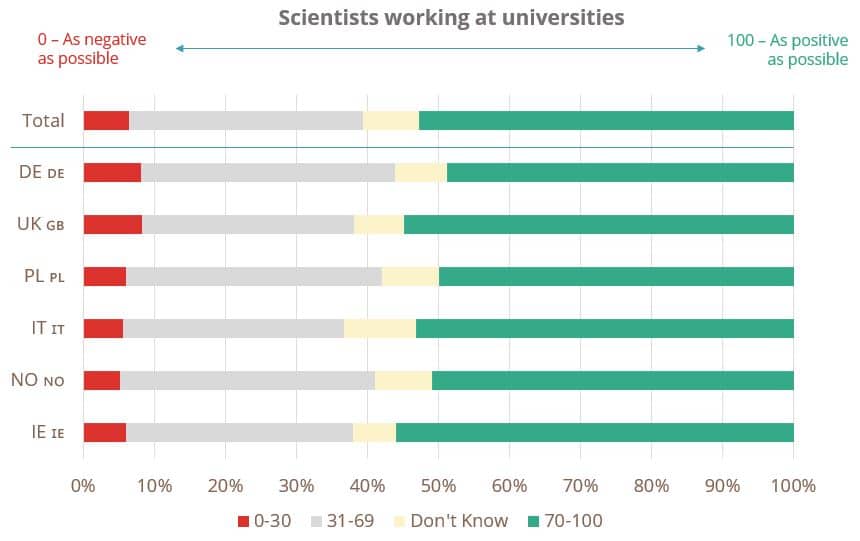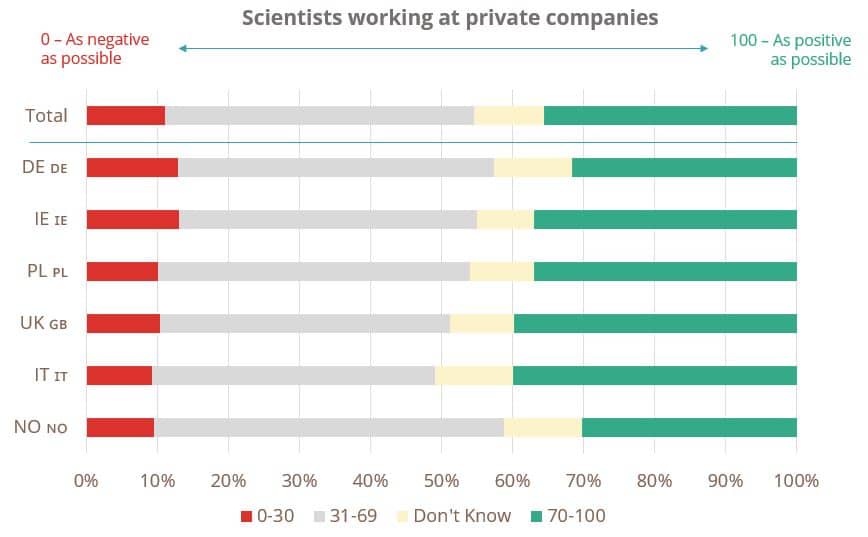
Negative Feelings towards Government Are Highest in Poland and UK – PERITIA Survey
Negative feelings about national governments and the European Commission are general among six surveyed European countries and stand in strong contrast to the positive feelings expressed towards scientists. In Poland six in ten people feel negatively towards their government while the UK is the country where most people say the government ignores rules and procedures (62%).
The EU-funded project PERITIA released today the first results of its survey on trust in government and expertise. The study covers the UK, Ireland, Italy, Germany, Norway and Poland. The six countries were selected to reflect a range of different contexts across factors such as location within Europe, population size, GDP levels, political structure and levels of trust in institutions, as measured in other studies.
“This major study across six countries clearly shows the challenge many governments face with the public’s perceptions of their trustworthiness. None of the countries in the study do particularly well, with large proportions in each saying they’re cautious in trusting their government, disagreeing that they are honest, truthful and provide unbiased information – although people do tend to be more positive in Norway and Germany than other countries”, said
According to the results, 61% of people in Poland say they feel negative about their national government. The proportion who holds this view is 25 points higher than the average across the six countries, of 36%. The UK (38%) and Italy (36%) rank second for such negative feelings, while people in Norway are least likely to have a negative perception of their own government, with 20% having an unfavourable view, compared with 33% who feel positive.
In the UK, 62% of people say the government ignores rules and procedures – the highest across the six countries surveyed. In Poland, which ranks second on this measure, 50% think their government disregards rules. Germany (35%) and Norway (34%) are least likely to have such a negative perception of government rule-following, with around a third in each country feeling this way.
“The key point of difference that stands out in the UK is that six in 10 say the government ‘ignores rules and procedures’, compared with an average of 44% across the countries as a whole and only 34% in Norway – which will reflect the widespread coverage of ‘partygate’ in the UK”, said Professor Bobby Duffy, director of the Policy Institute at King’s College London, said.
How well would you say the following characteristics generally describe the [national] government? Ignores rules and procedures

75% in Poland say their government is not well respected while Norway is the only country where a majority feel their government is respected (52%)
Other findings of the survey evaluate how likely people think their government is honest and truthful. Poland has the most negative view of its government on this measure, with 70% saying the country’s government is not honest and truthful. In the UK, 53% of people say the same about their government – double the proportion who think it is honest and truthful (25%).
People in Norway have the most positive perception of their government’s honesty and truthfulness. But despite this, opinion is still relatively divided, with 34% thinking the government has these characteristics and 36% saying it does not.
In general, people think their government is not well respected. People in Poland hold the most negative views on this measure, with 75% saying their government is not well respected. 66% of the UK public think the government is not well respected – around double the proportion who think it is well respected (31%).
Germany, Ireland and Italy hold a less negative (52%, 58%, 60%). At the other end of the spectrum, Norway is the only country surveyed where a majority (52%) feel the national government is held in such good standing.
How well would you say the following characteristics generally describe the [national] government? Well respected

The UK feels most negative towards the European Commission
33% of people in the UK rate their feelings towards the European commission negatively – the highest among the nations surveyed, and above the six-country average of 23%. In Ireland, the view is very different, with just 14% feeling negative towards the European Commission. The most favourable view of the European Commission is in Ireland and Poland where, respectively, 33% and 37% view the organisation positively.
Questioning respondents on whether they mostly share similar values to the European Commission, the UK has the lowest proportion of people who think the European Commission mostly shares similar values to them, with 27% reporting this – similar to Germany, where 31% feel the same. 49% of people in Poland think the European Commission mostly shares similar values to them – more than double the 22% who thought this of their own government.
Which of the following two statements comes closest to your view about [the European Commission]?

People have, on average, more negative feelings towards social media platforms than traditional media
People in most countries take a neutral view on their feelings towards news and media organisations. On average, 44% of people across the six nations do not have particularly negative or positive feelings towards news and media organisations.
Norway (30% vs 16%) and Germany (31% vs 21%) are the only countries surveyed where people are more likely to feel positively than negatively about news and media organisations. 31% of people in the UK have negative feelings towards news and media organisations. This figure is similar in Poland, where 32% feel the same. The country with the least negative view is Norway (16%).
An average of 31% of people across the six countries have negative feelings towards social media platforms. Those in the UK are among the most likely to feel this way (40%), along with Germany (38%) and Ireland (36%). The country with the most favourable views of social media platforms is Poland, where 20% feel negatively about them, compared with 31% who feel positively.
We’d now like to get your feelings toward this list of people or institutions on a “feeling thermometer”. How do you feel towards each of the following? Write the number in the box between 0 and 100 that reflects your feelings.


On average, people have positive feelings towards scientists
There are very limited negative feelings towards scientists working at universities, with an average of just 6% holding an unfavourable view of them, compared with 53% who have a favourable perception. The countries with the most positive view of such scientists are Ireland (56%) and the UK (55%).
Just one in ten have negative feelings towards scientists working at private companies. Across the six countries, an average of 11% rate their feelings towards scientists working at private companies negatively, while 36% say they feel positive towards them. The countries with the most positive view are Italy (40%), the UK (40%) and Ireland (37%).
Poland stands out for negative sentiment towards scientists working with the government, while the UK and Ireland are most positive. 32% of people in Poland rate their feelings towards scientists working with the government negatively – much higher than the six-country average of 17%. In Ireland, just 12% feel negatively about scientists with such a relationship with the government, and it is a similar story in Norway (12%) and the UK (14%). People in the UK (46%) and Ireland (45%) feel most positively about such scientists.
We’d now like to get your feelings toward this list of people or institutions on a “feeling thermometer”. How do you feel towards each of the following? Write the number in the box between 0 and 100 that reflects your feelings.


Norway has the most trusting view of people in general
In Norway, 40% feel most people can be trusted, making it the most trusting of the six nations surveyed. Ireland (32%) and the UK (32%) come next, while at the other end of the spectrum people in Italy are least trusting, with only 17% saying most people can be trusted, compared with nearly half (46%) who lean more towards thinking you can’t be too careful in dealing with people.
Generally speaking, would you say that most people can be trusted, or that you can’t be too careful in dealing with people? Please give your response on the following scale, where 0 means you can’t be too careful in dealing with people and 10 means that most people can be trusted.

The findings from this research were produced as part of PERITIA, an EU-funded project that aims to help citizens and policymakers understand trust in science and identify trustworthy expertise. This project has received funding from the European Union’s Horizon 2020 research and innovation programme under grant agreement No 870883.
Public attitudes towards national government and other institutions
Read the full report ‘Public attitudes towards national government and other institutions’ here. You can also find additional reports according to the country: Germany, UK.


